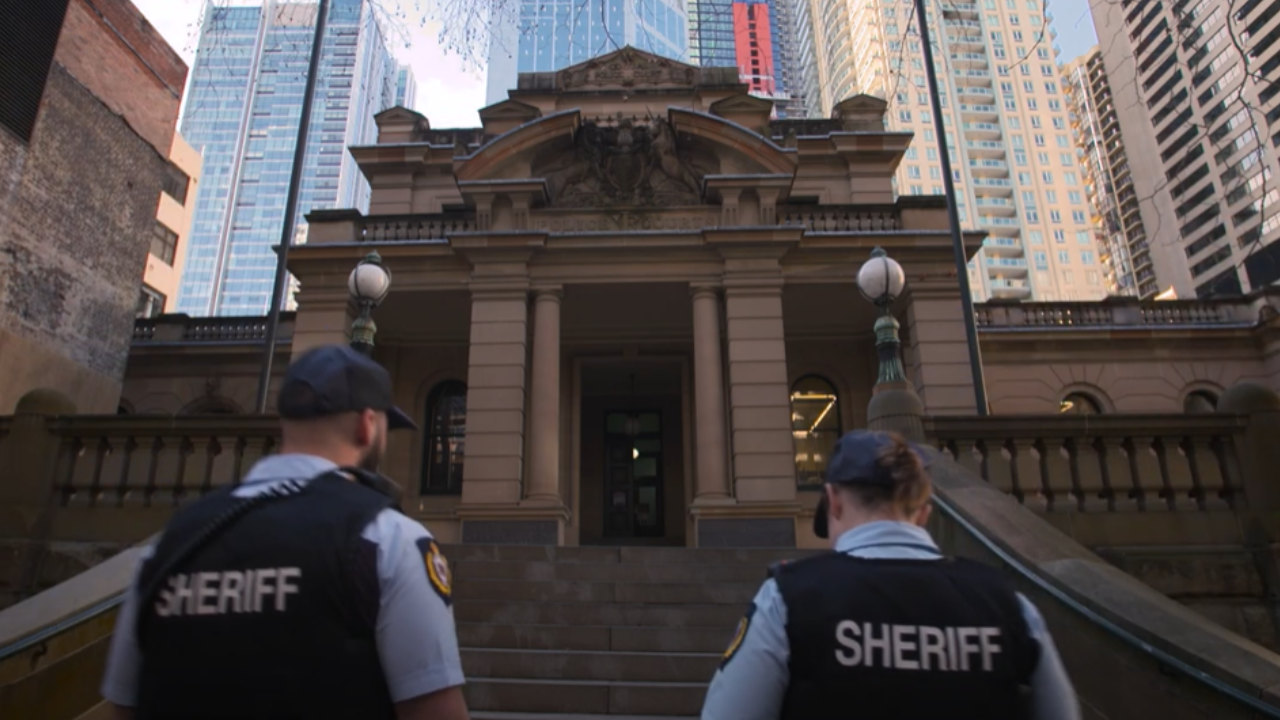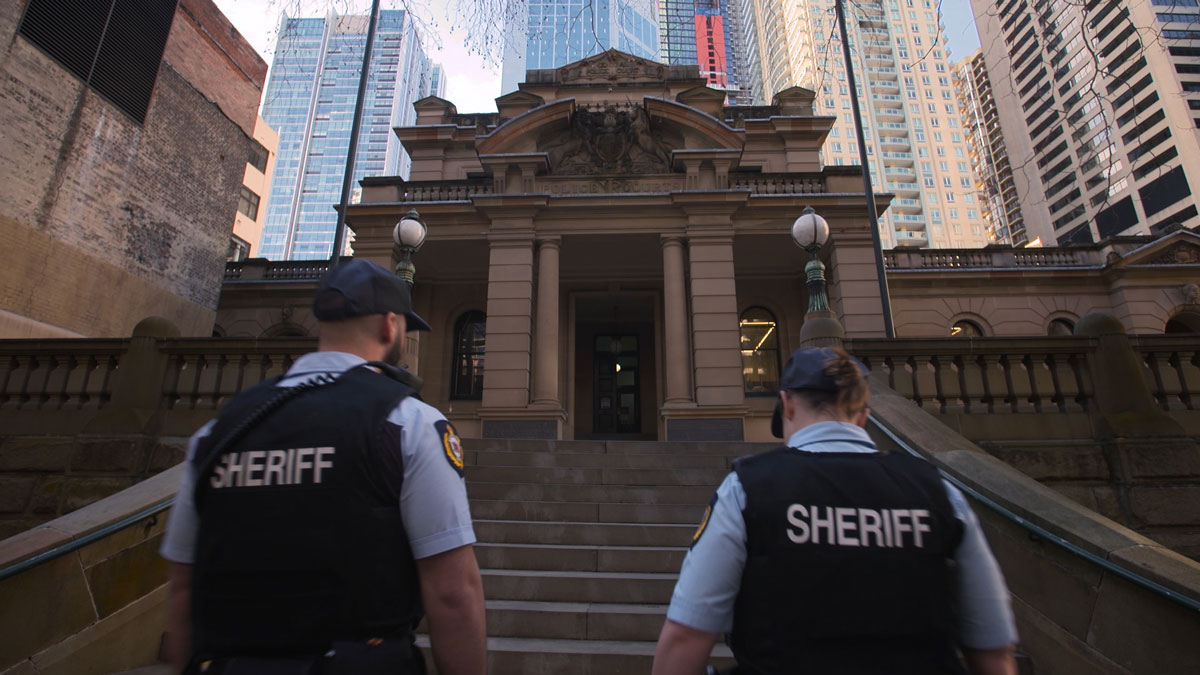Automatic language translation
Our website uses an automatic service to translate our content into different languages. These translations should be used as a guide only. See our Accessibility page for further information.

(Two Sheriff’s Officers walking up the stairs to a court.)
Bruce, Sheriff’s Officer: I don't think anybody's that clear about what Sheriffs do until they need a Sheriff.
(Sheriff’s Officer vehicle driving through the countryside.)
They just think of cowboy movies that we're going to have a horse ride into town that's not what we actually do though.
Kathleena, Superintendent Security Coordinator, Hunter North Command: The Sheriff's Office is a law enforcement organisation that does civil law enforcement and court security operations.
(Time-lapse of Downing Centre Local Court in Sydney.)
Bruce: We protect the court system try to make it run smoothly and enact any orders that the court make, we protect everybody in the court.
(Court proceeding, Sheriff’s Officer using radio communication.)
Jerry, Probationary Sheriff’s Officer: Upholding the justice system is very important to the community and I believe everyone should respect the law.
(Close up of the coat of arms at the Downing Centre Sydney.)
Marrie-Ann, Sheriff’s Officer: The work we do ensures the safety of our officers as well as the general public and the judicial system. There is lots and lots of training and endless amount of training.
(Sheriff’s Officers training.)
Kathleena: There are no two days that are the same in the Sheriff's office.
Bruce: Before i was a Sheriff I was a farmer, something completely different
(Bruce walking in a farm.)
Marrie-Ann: I was studying at university.
(Marrie-Ann sitting by a tree working on a laptop.)
Jerry: Before joining the sheriff office I was into IT.
(Jerry working on network cables.)
Kathleena: I never thought i would be involved in law enforcement.
(Kathleena sitting at a park bench.)
Kathleena: My persistence since joining the office of the Sheriff has really seen me travel a long way.
(Kathleena walking through the office and presenting to colleagues.)
Bruce: Well, a sheriff can come from any background it doesn't matter what you
did before.
(Bruce moving stakes for a fence.)
Jerry: There is no restriction if you are a male or female whatever category you are and it doesn't matter.
(Three Sheriff’s Officers discussing a report.)
Marrie-Ann: The role as a sheriff's officer focuses on teamwork.
(Sheriff’s Officer gets called to an incident.)
Kathleena: Determination, resilience, persistence, and passion
Bruce: We all do the same job we all need to back each other up we're all part of the same team.
(Sheriff’s Officer walking in different locations.)
Bruce: I think to be a sheriff you need to have compassion and empathy as well.
(Sheriff’s Officer talking to a member of the public.)
Marrie-Ann: I think everyone that's coming through the doors isn't always coming for a good reason.
Kathleena: I have seen people in their darkest hours and face a lot of adversity.
(Sheriff’s Officers delivering a court order to a home.)
Bruce: You do see a lot of people in some terrible situations everybody deserves your respect when they come through the courtroom door.
Marrie-Ann: My role at the moment has given me a wealth of knowledge.
(Marries-Ann conducting surveillance in the control room.)
Bruce: It's a secure job there's room for progression.
Kathleena: There's always opportunities to do other roles whether it be for a short amount of time or a longer period of time.
Jerry: Coming to work daily that's my favourite thing to do.
Bruce: I'm proud to be a Sheriff I go to work with other people who are proud to be a Sheriff I feel part of a team.
Kathleena: It has been the most rewarding career that I have ever been involved in.
Did you know that it has been 200 years of the NSW Sheriff’s Office working to support and protect our justice system?
Learn more about the unique and essential role of the Sheriff since 1824, by watching our mini documentary.
Sworn uniformed Sheriff’s Officers have law enforcement, security and other court related responsibilities under the direction and supervision of the Officer-in-Charge.
The law enforcement duties include serving summonses and enforcing writs, warrants and orders issued out of the various courts. The security duties involve maintaining the security of court complexes and the safety of people attending these complexes.
Interested in becoming a NSW Sheriff's Officer in the future? Fill out the expression of interest form (EOI) below and register your interest in joining our team.

The necessary experience and qualities considered for the role include, being an Australian Citizen or have permanent residency status in Australia, hold a current Australian Driver’s License (P1 and above), hold a current First Aid certificate and be physically fit and mentally resilient.
Pre-employment checks are a critical part of the Sheriff's Officer recruitment process and includes criminal history and integrity checks, fingerprint check, physical and medical assessment, and other reference and conduct checks.
At times, the duties of a Sheriff’s Officer can be physical and may involve running, bending, lifting heavy objects and being able to navigate obstacles in tight spaces.
Sheriff’s Officers may also need to use self-defence and control/restraint techniques during a critical incident.
To make sure you can perform the role and functions of a Sheriff’s Officer, you will be required to undertake a medical and physical assessment.
The medical assessment is designed to assess your overall health and check if you have any medical conditions that may impede your ability to safely perform the duties of a Sheriff’s Officer. This can include testing your core, upper body, lower limb, grip and overall strength and mobility. As the role requires the use and correct interpretation of X-ray scanning technology and colour displays, normal colour vision is mandated and your colour vision will be assessed.
Mental resilience is also a requirement of the role as you can be regularly exposed to explicit information and footage relayed in court hearings including child and sexual assault matters.
It’s important to prepare for the fitness assessment well in advance as you may only have one opportunity to successfully complete it. You should aim to be fit enough to complete:
Working a 35-hour week, Monday to Friday (20x 8-hour shifts in a 28-day cycle) provides Sheriff's Officers the flexibility to thrive at work, home, and the community.
Sheriff's Officer recruits are required to successfully complete a 12-week induction program at the NSW Sheriff and Justice Academy, at the commencement of their employment. Recruits must also complete the Certificate III in Government within 12 months of becoming a sworn Sheriff's Officer.
Sheriff's Officers are required to wear uniforms and appointments which are supplied. Sheriff's Officers are expected to comply with the supplied dress manual in all areas. This includes requirements for piercings, facial hair and the covering of tattoos and body art.
Last updated: